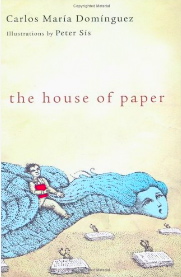“When we read under our breath, we produce the sound of the letters at an inaudible frequency. But the sound is still there. The voice is present, it is never missing. It follows the line just as an instrument follows a sheet of music, and I can assure you it’s just as essential as the eyes. It creates a tone, a melody that flows through words and phrases, so that if you add real music at a soft volume, deep inside the ear a harmonic counterpoint is created between one’s own voice and the music from the speakers.”
This short, liter ary novel explores themes which academicians have discussed for generations–the relationship between language and reality, the belief that creating a library is akin to creating a life, the idea that books can take on a life of their own, and the obsessive collection of books and reverence for them. Creating an allegory of the literary world and its complications, author Carlos Dominguez tells what appears to be a simple story–part mystery, part satire, and part quest.
ary novel explores themes which academicians have discussed for generations–the relationship between language and reality, the belief that creating a library is akin to creating a life, the idea that books can take on a life of their own, and the obsessive collection of books and reverence for them. Creating an allegory of the literary world and its complications, author Carlos Dominguez tells what appears to be a simple story–part mystery, part satire, and part quest.
When Bluma Lennon, a professor at Cambridge and a Joseph Conrad scholar, is hit by a car while crossing the street, she had been reading Emily Dickinson. Several months later, a copy of Conrad’s The Shadow Line, coated in cement, arrives at her former address from “Carlos,” a man she had met at a conference in Latin America. The unnamed narrator of the story, originally from Buenos Aires (where Jorge Luis Borges lived), returns to Buenos Aires and eventually travels to Montevideo in search of Carlos Brauer, a former lover of Bluma, and the owner of an extraordinary collection of books.

As the narrator travels to meet scholars and antiquarian book sellers, he acquires additional information about Brauer, who has apparently gone mad. After accidentally setting the index of his books on fire and being unable to find anything in his weirdly organized collection, he moves to the seashore and builds a house from bricks pressed from the waterlogged books in his collection. Conrad’s The Shadow Line, which he has returned to Bluma, is obviously from this damaged collection, and the symbolism of this book and its themes of a man’s rejection of his youthful illusions, the belief in the sea as a healer, and the search for self-knowledge help explain Brauer’s life.
Though the novel is carefully written, its self-consciously literary approach and its use of allegory and satire keep the “reality” of the plot at arm’s length. The themes dominate the novel, and the reader must constantly ask what the unfolding events mean or represent as the parallels and conflicts between real life and the life of books unfold. Characters are more symbolic than real, and their behavior often becomes a satire of their academic lives. Erudite and clever, the novel exists on its own terms, rather than through any direct connection with the reader.
Notes: Born in Argentina, the author has lived in Uruguay for many years. His photo appears on http://www.fantasticfiction.co.uk
